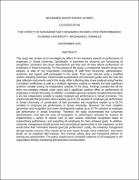The Effect of Non-Monetary Rewards on Employee Performance in Simad University, Mogadishu, Somalia.
Abstract
This study was carried out to investigate the effect of non-monetary rewards on performance of employees in Simad University. Specifically, it examined the existence and functioning of recognition, promotion and career development and how each of these affects performance of employees in Simad University. For the purpose of this study, a correlational research design was adopted. A total of 152 respondents comprising of staff from Rectorship, administration, academics and support staff participated in this study. These were selected using a stratified random sampling technique. Closed ended questionnaire and interview guides were the main the data collection instruments used in this study. After collecting data, it was analyzed using Pearson Correlation coefficients as well as a multiple regression analysis to identify the most significant predictor variable among the independent variables of the study. Findings revealed that all the three non-monetary rewards under study had a significant positive effect on performance of employees in Simad University. In addition, a multiple regression analysis revealed that promotion is the best independent variable to explain employee job performance in Simad University. The results indicated that promotion alone explains up to 61.2% variation in employee job performance in Simad University. A combination of both promotion and recognition explain up to 65.7% variation in employee job performance in Simad University. Moreover the three variables (promotion and recognition and career development) explain up to 67.7% variation in employee job performance in Simad University. Therefore, the study recommended that University administration must take the issue of recognition on performance seriously for instance by implementing a variety of awards such as team awards, individual recognition based on extraordinary performance, and rewarding all employees for their achieved goals. In addition, university management should provide more promotional opportunities to the employees, as this would drive their motivation towards good job performance. Lastly, the university management through human resource office should devise new means through which employees’ motivation levels can be sustained after training. This involves setting clear and transparent policies on training and advancement. The policy should ensure consistent treatment of all employees in the organization thereby minimizing discrimination and favoritism.
Collections
- Thesis and Dissertations [126]

